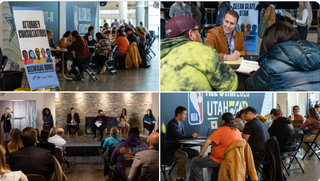Photo: NBA
This month’s NBA All-Star Weekend festivities will extend far beyond the court, with 2023 activities to include a concerted social issues focus relative to criminal justice reform and the need for—and power—of second chances. This as the Clean Slate Initiative and the National Basketball Social Justice Coalition (NBSJC) join forces to support those who are returning to society after serving time and seeking to be productive members of their communities.
With a bipartisan policy model, Clean Slate works to update and expand eligibility for arrest and conviction record clearance for those remaining crime-free for a period of time. The Clean Slate Initiative aims to raise awareness about the 1 in 3 Americans who live with an arrest or conviction record and, consequently, face barriers to meaningful employment, housing, education and other opportunities.
Together, Clean Slate and the NBSJC are leveraging the power of professional basketball to raise awareness about the expungement process, advance social justice, dismantle systemic racial inequality, highlight the importance of a collaborative reform approach and advocate for better policies at the federal, state and local levels. The CEO of the Clean Slate Initiative is Sheena Meade.
The NBA All-Star Weekend comes on the heels of the recent Utah Clean Slate Summit co-hosted by the Utah Jazz— an event that helped people not eligible for automated relief under Utah’s Clean Slate law navigate the petition-based expungement process.
“Everyone deserves a second chance,” said Jazz owner Ryan Smith in a recent NBA.com report. “There are 400 [event attendees] who woke up this morning and decided that today’s a new day, and their lives are going to change. … They’re leaving the past behind, and that’s what all this is about.”
Underscoring the need for reform, about the Summit Utah Governor Spencer Cox said, “Unfortunately, people pay their debt to society, and then that’s still hanging over their heads in ways that are unfortunate. We know better, we know we can do better…”
Relatedly, Salt Lake City Mayor Erin Mendenhall also strongly advocates for ‘second chance’ chance, having cited, “We’re going to keep doing whatever we can and invent new ways to help remove barriers.”
“Our organization’s work with government agencies and influential coalitions like the NBA Social Justice Coalition is intended to create real, transformational change in people’s lives,” notes Meade. “Clean Slate efforts are rooted in the American Dream: the belief that if you work hard, you should be able to get ahead and provide for your family. Everyone deserves a shot at redemption, and no where is that point made more clear than in sports. We all love a comeback story. It gives us hope to see someone find a way back after making a mistake.. People who have made mistakes, paid their debt to society, and now want to make a better life for themselves and those who depend on them deserve a chance to do so.”
Clean Slate Summit: A Retrospective
On February 6th, Clean Slate Utah, the NBA Social Justice Coalition, the Utah Jazz, and Rasa Legal co-hosted the Utah Clean Slate Summit and free record expungement clinic held at the Vivint Smart Home Arena in Utah. The summit was a platform to highlight Utah’s Clean Slate law, which came into effect last year and allows for the automatic expungement of certain criminal records for hundreds of thousands of Utah residents. The event featured a panel discussion among community leaders, including Sheena Meade, CEO of the Clean Slate Initiative (CSI), Utah Jazz Chairman Ryan Smith, and Utah Commissioner of Public Safety Jess Anderson.
The Summit also included an expungement clinic and resource fair, where participants could check their eligibility for expungement using Rasa’s web application and receive support from a volunteer expungement lawyer. Over 150 people received free BCI application support from Clean Slate Utah and 100 cases received free legal representation thanks to a sponsorship from USARA. Nearly 200 volunteers participated in the event, including over 40 lawyers and 60 community partner organizations.
CSI’s Sheena Meade spoke about the growing support for clean slate policies across the country, hoping that other states will adopt Utah’s approach of “people over politics” and introduce their own clean slate laws. Sidni Shorter, the CEO of Utah’s Black Chamber of Commerce, emphasized the economic impact of clean slate policies and urged the business community to invest in others and look beyond a criminal record.
The Clean Slate Summit was a success, with 443 people registered for the event and over 150 people receiving free BCI application support. It was a powerful demonstration of the potential for a collaborative local and national approach to advancing social justice and supporting those with criminal records.
The Clean Slate Initiative: https://www.cleanslateinitiative.org/





